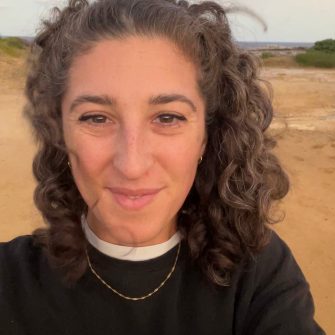
Lizzie Crouch
Email: lizzie.crouch@unsw.edu.au
Supervisors: Lizzie Muller, Matthew Kearnes
Lizzie Crouch has an established practice as a creative producer. She has been the Senior Coordinator of Engagement for SensiLab, Monash University, produced art-science seasons for the Science Gallery network (MOUTHY 2016, London and BLOOD 2017, Melbourne), and worked as a freelance creative producer for diverse organisations including Superflux, the Royal Botanic Garden Edinburgh, Science Gallery International, and the Francis Crick Institute. This work has been featured in publications including NewScientist among other major news outlets, and has been recognised by the World Health Organisation for its an innovative approach to science engagement. She is currently bringing her expertise to her role co-chairing the Sydney Arts Management Advisory Group (SAMAG) committee.
In addition to her PhD research, Lizzie is currently undertaking research as a Senior Research Associate in The Australian Research Council Centre of Excellence for Australian Biodiversity and Heritage. She was a member of program committee for The Seventh Transdisciplinary Conference on Imaging at the Intersections of Art, Science, and Culture (2022), and was a reviewer for academic submissions to ISEA 2024. Lizzie was the HDR student representative on the UNSW Faculty of Art Design and Architecture’s Equity, Diversity and Inclusion Committee (2022-23). She was also HDR representative for UNSW School of Art and Design (2022), for which she was recognised with a Faculty Student Experience Award.
In 2021, Lizzie co-created and facilitated the Ars Electronica Creative Producer Program, which resulted in the Manifesto for Creative Producing. She has continued to advance research and practice in creative production in founding the Partnership for Creative Producing alongside Nicholas Medvescek. As part of their collaborative work, Lizzie and Nicholas have co-convened the course Creative Production and Your Impact in the Global Market for Emerson College’s Business of Creative Enterprises, which explores how unique approaches to the creative process can generate cultural and economic value in different contexts.
Lizzie is an established facilitator and speaker. Recent talks and events include a guest lecture on art-science and creative production for the International Master's Program in Curating (Stockholm University) and group facilitation for teenagers contemplating the interdisciplinary future of work for the Future Innovators Summit (Art Thinking, Newcastle, Australia).
Lizzie has a MSc in Science Communication from Imperial College London and a BA(Hons) in Physiological Sciences from Oxford University.
- Research area
- Research outputs
Lizzie Crouch is a Creative Producer and Researcher specialising in interdisciplinary approaches to science engagement, specifically art-science collaborations. Her research is focussed on how the practices that bring art and science disciplines together can reduce barriers to engagement for audiences underserved by existing science engagement experiences.
She is currently undertaking practice-led research that investigates whether and how creative producing as one approach to collaboration engages more diverse audiences. For this, she has drawn on theories of social reproduction, social justice, and third space to develop a theoretical framework that defines both inclusion and the unique mechanisms that can drive it in art-science. She has also developed new methodologies to undertake reflexive data analysis practice more rigorously in collaboration with a community of practice in order situate and contextualise her work within the field of art-science.
Her work aims to generate a deeper understanding of the potential of interdisciplinary creative practice and its impact on science in society, and to provide evidence and pathways for best practice in the field of art-science engagement.
- Art-Science Impact: Widening the frame of knowledge generation (Ars Electronica festival, 2023): Presentation and workshop that guided participants through a series of exercises that allowed them to collectively redefine the impact of art-science projects in academic spaces. In doing so, the workshop investigated the conditions for success in collaborative practices and – responding to the festival theme, Who owns the Truth? – the ownership of knowledge within these collaborations.
- Expanding Models of Creative Production (Ars Electronica festival, 2023): Co-developed and delivered a workshop program to critique and expand The Manifesto for Creative Producing. Across three sessions participants were invited to add their authorship to the Manifesto. Festival goers, in dialogue with the original authors, contributed their own knowledge to the Manifesto’s artistic interpretation and deepened their connection to their own practice.
- Mangal Bungal: Clever Hands (Queensland Museum, 2022-2023): Project initiator and creative producer on a project which saw the Dingaal community of Far North Queensland lead a program of creative activations at Queensland Museum during NAIDOC week 2023. The program brought to life traditional knowledge and stories behind the Connections across the Coral Sea exhibition through dance, storytelling, hands-on workshops, and immersive digital projections.
- Creative Producing as a nomadic creative practice in a global Pandemic event (The Nomadic Image, online, 2022): Group presentation and paper (lead author, in press) that used Deleuze and Guattari’s Nomadology as a lens to explore creative production. This established a baseline of understanding around the ways in which a creative producer, and creative producing practice, share key features of nomadic practice and philosophy. It begins a conversation about communities, attitudes, and methods within creative production that can be built upon as the field continues to grow.
- Creative Producing: A new framework for inclusive interdisciplinary work (AusSTS, 2022): Conference presentation responding to the 2022 theme, Generation. Observing that collaborations where differences are embraced as ‘constructive friction’ are more generative, the presentation argued that for such collaborations to be achieved, collaborators need to enter it with a specific orientation to work that places values, politics, and ethics at the centre of the project. This approach can be defined as creative producing, a values-led approach to practice that allows collaborators to have such an orientation to work, and to select methods, leading to more inclusive outcomes.
